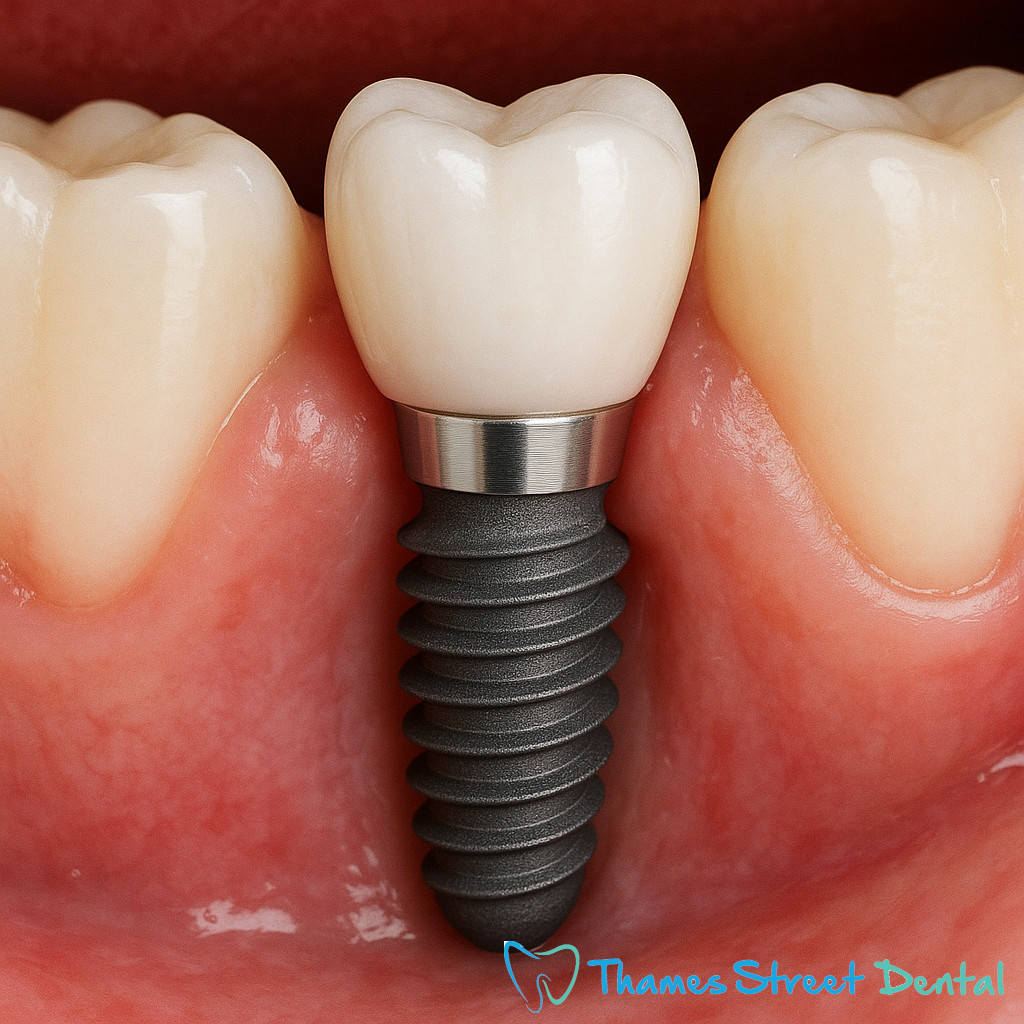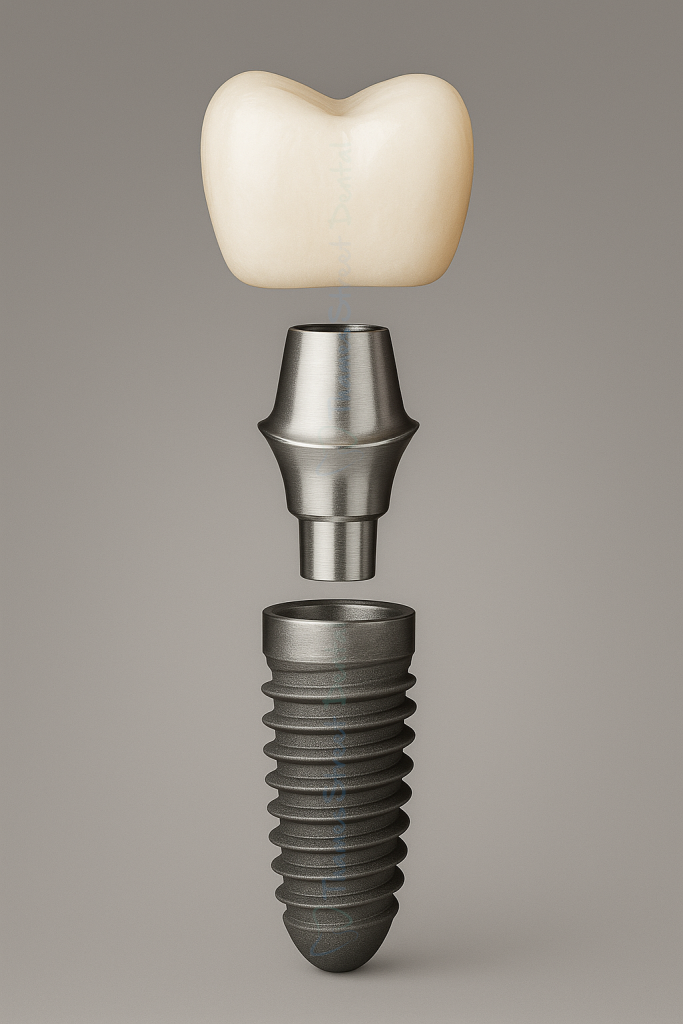
Welcome! If you’re exploring options for replacing missing teeth and want a permanent, natural-feeling solution, this beginner’s guide to dental implants is for you! We understand that dental implant surgery can seem daunting, but we’re here to provide clear, reassuring information, helping you understand if dental implants are the right choice for your new smile.
Dental implants are essentially artificial tooth roots, typically made of titanium, that are surgically placed into your jawbone by a dental professional. Think of each dental implant as a sturdy foundation for a replacement tooth. They provide a permanent solution for replacing missing teeth and offer a stable base for a crown, bridge, or denture. The American Academy of Implant Dentistry confirms that dental implants are a safe and effective solution for many people.

The magic of dental implants lies in a process called osseointegration. This is where the titanium implant fuses directly with your jawbone, creating a strong and stable anchor for your new teeth. Over time, the bone grows around the implant, effectively becoming part of your natural tooth’s structure. This process ensures that your new tooth is secure and functions much like real teeth, providing a long-lasting solution for replacing missing teeth and preventing bone loss.

A dental implant system consists of three main parts. These components work together to create a replacement tooth that looks, feels, and functions like your own natural teeth, giving you a confident new smile:
There are several reasons why individuals might need or want to get dental implants. Often, it begins with the loss of one or more teeth due to tooth decay, gum disease, or a mouth injury. Some people may also be missing teeth from birth. Regardless of the cause, missing teeth can impact your oral health, affecting your ability to chew and speak properly. Missing teeth can also cause the surrounding teeth to shift, leading to further dental problems (Teeth Straightening may help with this). When considering dental implants, it is crucial to consult with a dental professional to determine the best course of action for your specific needs and situation. An x-ray can help the dentist assess the jawbone density and determine if you are a suitable candidate for dental implants or if a bone graft is necessary.
The benefits of dental implants extend far beyond just replacing a missing tooth. Unlike dentures or dental bridges, dental implants provide a permanent solution for missing teeth. Because dental implants fuse with your jawbone through osseointegration, they provide unparalleled stability and support. This stability improves your ability to chew and speak comfortably. Furthermore, dental implants help prevent bone loss in the jaw, which can occur when teeth are missing. Choosing dental implants can significantly improve your oral health, overall quality of life and give you a new smile.
Dental implants not only restore functionality but also significantly enhance your smile’s appearance. The artificial tooth, or crown, that attaches to the abutment is designed to look and feel just like your natural teeth. A skilled dental professional at Thames Street Dental will carefully match the colour, shape, and size of the crown to your existing teeth, ensuring a seamless and natural look. This restoration of your smile can have a profound impact on your confidence and self-esteem. If you are self-conscious about missing teeth, dental implants can provide a life-changing solution, allowing you to smile, speak, and eat with complete confidence. The success of dental implants can give you a natural look.
Embarking on the dental implant journey at Thames Street Dental begins with a comprehensive dental exam. Your dentist will assess your oral health and jawbone density, often using an x-ray to determine if you are a suitable candidate for dental implants. If you are, and you wish to go ahead, the dental implant surgery is scheduled.
The surgical procedure involves carefully placing the dental implant into your jawbone under local anaesthesia or sedation if you prefer. The dentist will make an incision in the gum to expose the bone, then a pilot hole will be created for implant placement.
If your jawbone lacks sufficient density to support the dental implant, a bone graft may be necessary. This involves adding new bone to the area to provide a solid foundation. Following the placement of the dental implant, the crucial process of osseointegration begins. During this process, the titanium implant will fuse with the jawbone. This can take several months, but it creates a strong and stable base for your replacement tooth. The American Academy of Implant Dentistry stresses that the osseointegration process is key to ensuring that dental implants are successful.
After the surgical procedure, some discomfort is normal. Your dentist will provide pain medication and detailed aftercare instructions to manage any discomfort. It’s essential to maintain excellent oral hygiene during the recovery period to prevent infection and promote healing. Regular dental visits will be scheduled to monitor the osseointegration process and ensure the dental implant is properly integrating with the jawbone. With proper care, your dental implant could last a lifetime, giving you a long-lasting and reliable solution for missing teeth and a radiant new smile. You can get dental implants for a new smile!
When considering tooth replacement options, dentures and dental implants are two common choices. Dentures are removable appliances that sit on top of the gums, replacing multiple or full sets of missing teeth. While dentures are a more affordable option, they lack the stability and permanence of dental implants. Dentures can sometimes shift or slip when speaking or eating, and they don’t prevent bone loss in the jaw. Dental implants fuse with the jawbone, providing a stable and long-lasting solution for missing teeth, maintaining bone health and function. A dental professional can discuss your options.
Dental bridges are another alternative to dental implants for replacing a single tooth or a few missing teeth. A dental bridge involves attaching an artificial tooth to the adjacent natural teeth, using them as anchors. While bridges are less invasive than dental implants, they require altering the structure of healthy teeth. Additionally, dental bridges don’t prevent bone loss in the jawbone where the tooth is missing. Dental implants, on the other hand, offer a self-sufficient solution, preserving the integrity of surrounding teeth and stimulating bone growth. Many who are considering dental implants find them a better choice.
The long-term benefits of dental implants extend beyond simply replacing missing teeth. Dental implants provide a permanent solution that preserves your oral health, prevents bone loss, and restores your smile’s natural look and feel. Unlike dentures or bridges, dental implants don’t require special maintenance, and they function just like real teeth. With proper care and regular dental visits, dental implants can last a lifetime, making them a cost-effective and reliable investment in your long-term oral health and overall well-being. Investing in dental implants with Thames Street Dental is investing in your new smile!
One of the most common concerns when considering dental implant surgery is pain. Rest assured that your comfort is our priority at Thames Street Dental. During the dental implant procedure, local anaesthesia is administered to numb the area, ensuring you feel minimal to no pain. For anxious patients, sedation options are available to help you relax throughout the surgical procedure. Many report that the discomfort is less than expected and manageable with over-the-counter pain relievers.
The cost of dental implants can be a significant factor for many patients. While the initial investment may seem higher than other tooth replacement options like dentures or dental bridges, it’s important to consider the long-term benefits. Dental implants offer a permanent solution for replacing missing teeth, potentially lasting a lifetime with proper care. This eliminates the need for frequent replacements, as is often the case with dentures and bridges. Flexible financing solutions are often available to make dental implant treatment more accessible.
Dental implants have a high success rate and are considered a safe and effective solution for replacing missing teeth. The materials used, typically titanium, are biocompatible, meaning they are well-tolerated by the body and fuse with the jawbone through osseointegration. Like any surgical procedure, there are potential risks, but these are generally minimal and can be mitigated by choosing an experienced dental professional. Regular dental check-ups are essential to maintain optimal oral health and get dental implants or dentures.
A common question we get asked at Thames Street Dental is, “Do dental implants hurt?” During the surgical procedure, local anaesthesia or sedation ensures you feel minimal to no pain. Afterwards, some discomfort is normal, but this can usually be managed with over-the-counter pain medication. Many patients report that the pain is less than expected. The dental professional will provide detailed aftercare instructions to help you manage any discomfort and promote healing. This helps you get dental implants with minimum problems. Bone loss is a big issue.
The entire dental implant process, from the initial dental exam to the placement of the final crown, can take several months. This is primarily due to the time required for osseointegration, where the dental implant fuses with your jawbone. This can range from three to six months. Bone graft procedures could make the dental implant successful. This process ensures a strong and stable foundation for your new tooth and is crucial for the long-term success of the dental implant and getting new teeth.
Caring for dental implants is similar to caring for natural teeth. Brushing twice daily, flossing regularly, and attending routine dental check-ups are essential. Your dentist may recommend special cleaning tools to reach areas around the implant. With proper oral hygiene and regular dental visits, your dental implant could last a lifetime, providing a permanent and reliable solution for replacing missing teeth. improve oral health, have a new smile and allow you to maintain optimal oral health and smile confidently. The American Academy of Implant Dentistry agrees to that.

